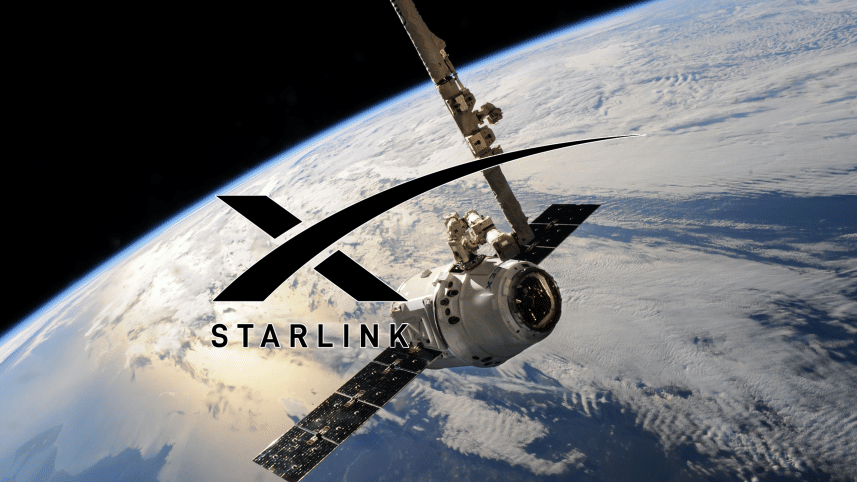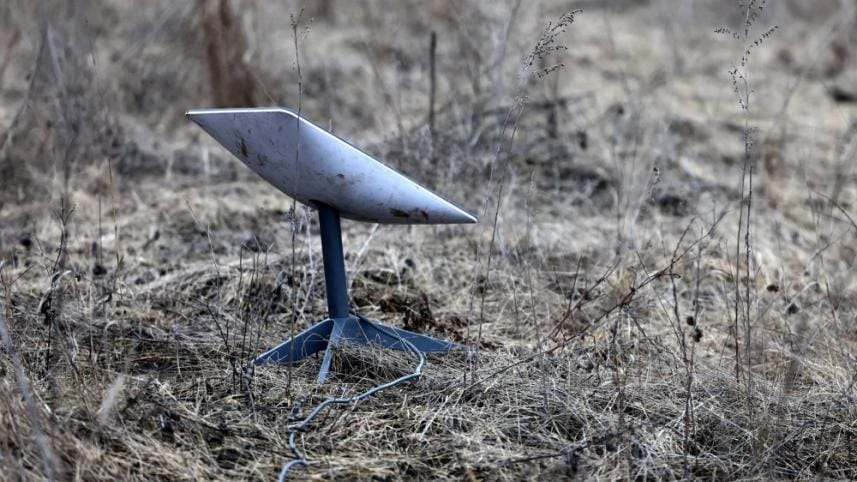Starlink in Gaza: Humanitarian Lifeline or Military Asset?

Starlink, the satellite internet project under Musk's SpaceX, began with the lofty ambition of blanketing the globe with high-speed internet. What started as a futuristic experiment quickly turned into a sprawling constellation of thousands of satellites, reshaping digital access in remote and conflict-stricken regions. Its role in Ukraine after Russia's 2022 invasion catapulted Starlink into global headlines. Musk's satellites kept Ukrainian forces connected when terrestrial systems failed, reinforcing its image as both a humanitarian and strategic tool. Since then, Starlink has become synonymous with resilience in crises—but also increasingly entangled in the politics of war.
In Bangladesh, most people had probably never heard of Starlink until the new interim government floated the idea of bringing it into the country. Overnight, it became a buzzword in the media, an object of fascination and debate. But for all the hype, the material need was far from obvious. Starlink is not poised to revolutionise internet access in Bangladesh's villages, nor will it deliver cheap connectivity to marginal groups. In fact, given its high cost relative to the country's socio-economic reality, only bulk users in urban centers could realistically benefit.

So why did the interim government take such an interest? The answer lies not in infrastructure but in geopolitics. In the wake of the July 2024 revolution that toppled Sheikh Hasina's authoritarian regime, Bangladesh found itself estranged from India, Hasina's strongest regional ally. To counter India's influence, the interim leadership sought closer ties with the United States. At the time, Elon Musk was seen as an influential figure within Donald Trump's orbit, and striking a Starlink deal was imagined as a way of currying favour with him—and by extension with Washington.
But this gamble may not have delivered. Musk and Trump have since had a very public falling-out, turning the once-strategic gesture into something of a wasted effort. Nonetheless, the episode ensured that Starlink became a household name in Bangladesh, more as a political brand than a technological necessity.
This tension between Starlink's dual role as technological infrastructure and as a geopolitical tool came into stark reality in Gaza. Since October 2023, Israel's relentless bombardment has demolished much of the enclave's communication networks, leaving hospitals, ambulances, and aid agencies cut off. To date, the Israeli army (IDF) has killed around 60,000 Palestinians—most of them women and children. The whole world is watching a livestreamed genocide, an indelible shame on humanity itself. It lays bare the uncomfortable truth that something is deeply broken in the current world order.
Going back to Starlink's involvement in Gaza, in early October 2023, as Israel targeted Gaza's telecom infrastructure, causing blackouts for 2.3 million Palestinians, Starlink was swiftly activated for the Israel Defense Forces (IDF). Facilitated by Sequoia Capital's venture capitalist Shaun Maguire, this deployment—within days of the attack—provided battlefield connectivity for drones and command systems, bypassing formal licensing by the Pentagon. By October 27, Israel's total communications blackout in Gaza prompted Elon Musk to pledge Starlink support for "internationally recognised aid organisations." Israel's Communications Minister Shlomo Karhi opposed this, citing Hamas could exploit it for "terrorist activities," threatening to sever ties with Starlink. No terminals connected from Gaza at the time.
On November 27, 2023, Musk visited Israel, touring attack sites with Prime Minister Benjamin Netanyahu and President Isaac Herzog. An agreement was reached: Starlink access in Gaza would require Israeli approval to prevent Hamas misuse, with Musk emphasising coordination with U.S. and Israeli security. By February 2024, Israel officially licensed Starlink for its local authorities and a UAE-run field hospital in Rafah, Gaza, with expansions needing security clearance. In July 2024, negotiations with the UN aimed to deploy Starlink at UN headquarters in Gaza for aid worker safety, though concerns persisted about Hamas theft and unmonitored communications. That same month, Starlink was activated at the Rafah hospital, enabling video consultations amid a dire shortage of functional medical facilities. By August 2025, Starlink operated fully in Israel, integrating with 5G, but remained largely absent from Gaza and the West Bank, where Palestinians relied on fragile 2G or eSIMs.

These events highlight the extraordinary bias and leverage Israel enjoys in its relationship with the United States—whether exercised publicly, privately, or through both acting in concert. The influence of the Israeli lobby in U.S. politics is so deeply entrenched that Israel appears to secure its way at every turn, regardless of whether Republicans or Democrats are in power. In Ukraine, every deployment of Starlink or any other private technological involvement required formal approval from the Pentagon. Yet in the case of Israel, such approvals seemed to materialise almost overnight. It is mind-boggling that a global superpower like the United States could so readily bow to the demands of a country as small as Israel.
This timeline also lays bare the dangers of dual-use technologies. The same satellites that linked Rafah's hospital may have simultaneously facilitated IDF operations in occupied territories. Starlink was initially positioned as a lifeline for aid amid blackouts (e.g., enabling UN and WHO contact with staff). However, its early IDF activation and exclusion from civilian Palestinian areas fueled claims of complicity in war crimes. A May 2025 report, by the Business & Human Rights Resource Centre (BHRRC), a UK-based nonprofit that tracks corporate accountability in human rights and international law issues, alleged Starlink and Palantir Technologies (a prominent American software company specialising in big data analytics and artificial intelligence platforms) enable "digital kill chains" for targeting in Gaza, using the conflict as a testing ground.
Moreover, Israel's insistence on "security oversight" ensured that aid could never be divorced from military control. Musk's vague assurances, meanwhile, lacked any system of accountability to verify who truly benefits from such connectivity. Human rights groups like Access Now condemned communication blackouts as "weapons of war," arguing restricted Starlink access hinders atrocity documentation.
The case of Gaza should serve as a wake-up call. Technologies like Starlink are never neutral; their access and deployment are shaped by the power structures that control them. The very fact that such systems can aid both hospitals and armies erodes their humanitarian claims. When technologies marketed as lifelines are repurposed as tools of war, their ethical standing collapses.

This is the paradox of dual-use innovation. To ignore its political dimension is to risk complicity in militarisation. As Gaza shows, humanitarian technology cannot be disentangled from geopolitical interests without rigorous scrutiny: Who gets to decide where it is deployed? How are "humanitarian" claims verified? What mechanisms hold corporations and states accountable when life-saving tools become enablers of war?
Starlink's global trajectory—from its supporting role in Ukraine against Russian aggression, to a hyped-up political talking point in Bangladesh, to a contested battlefield tool in Gaza—reveals an uncomfortable truth. In today's world of entangled technology and geopolitics, no innovation is ever purely humanitarian. The satellites above may promise connection, but on the ground they serve as much as instruments of power and violence as they do of aid.
Rushad Faridi, PhD, is assistant professor at the Department of Economics at the University of Dhaka. He can be reached at rushad.16@gmail.com.



 For all latest news, follow The Daily Star's Google News channel.
For all latest news, follow The Daily Star's Google News channel.
Comments